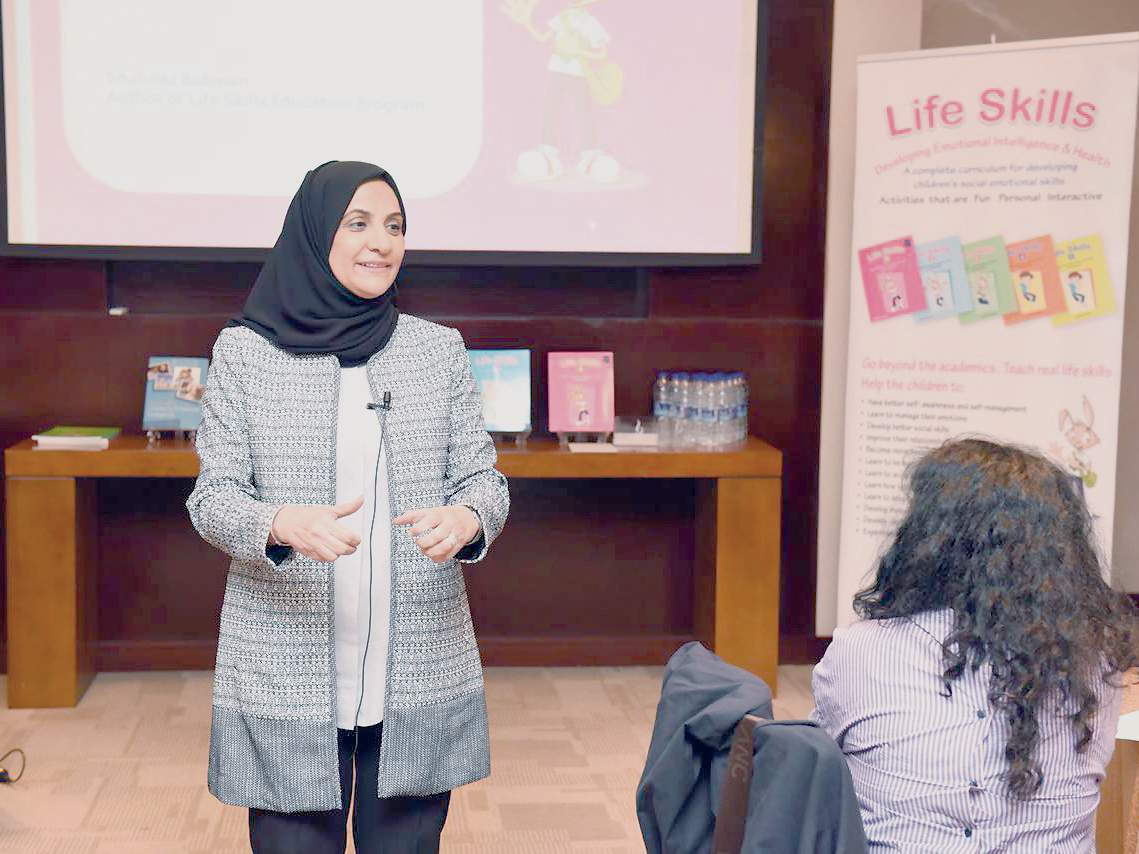

By Lakshmi Kothaneth — MUSCAT: April 23 - Research shows Emotional Quotient (EQ) is as important as Intelligence Quotient (IQ) in qualifying to secure a healthy career and life. Success depends 20 per cent on academic intelligence and 80 per cent on emotional intelligence, according to studies.
Shahnaz Bahman, the Bahraini author of Life Skills Series and a school improvement consultant, has been in the field of education for more than 25 years. Teachers, she says, need to be emotionally intelligent because they play an important role in the lives of students. “Everyone needs to be emotionally intelligent, especially teachers. Teachers are the most important beings on this earth because they are the ones who can make a difference as they touch lives.”
Emotionally intelligent teachers are those who can manage themselves well in class, understand students and build a good relationship with them. They have good relations with their colleagues, and above all, good relationship with themselves.”
Life Skills is an innovative educational programme for elementary schools. It aims at developing children’s social emotional intelligence, creating health and safety awareness and keeping them safe online, including on social media.
Life Skills is the region’s leading curriculum in children’s social emotional development, offered in both English and Arabic. It is taught in over 30 schools in Bahrain, Oman and Qatar.
The organisation has trained over 1,500 teachers, principals and parents in different countries free of charge. “We are adding a new dimension to children’s education — ‘teaching children how to be emotionally and socially intelligent’ — through our Life Skills curriculum,” she said.
The author says, “I would like to see all educators give serious consideration to children’s social emotional development and not to overlook it. I understand teaching academics is important, but my call is to go beyond academics. If social emotional development is neglected, it can have a huge negative impact on students. It can affect the quality of their lives and their performance at school.”
In some cases, she says, they can drop out of school. They can suffer from depression, anxiety, pressure and become unhappy, and fail in relationships not just as children but later as grown-ups.
According to Shahnaz, it can affect their health and safety. “We want schools to graduate students with a well-rounded personality. It’s not just about teaching subjects, it is about teaching the whole child.”
The main aim of Like Skills is to develop children’s social emotional intelligence. “We want children to become aware of their emotions and manage them in the right way. For example, if a child is getting frustrated, we want him to know he is getting frustrated. We teach the child how to calm down because when they are angry, they cannot act wisely. One needs to calm the brain first.”
They teach the children to “use the pause button”.
“Children can see the picture and visualise it. By doing nothing, the child calms down. We also teach different types of calming down, including belly breathing. They practise it in class. Making them think of something else or just counting 1 to 10, shifting their attention away from the matter, going for a walk or playing a game takes you out of the situation. When one calms down, one can look at the options available. Children are smart, they can think of options. With calmness, they are able to choose the right options,” said the educator.
It takes time for children to move from a reactive mode to active mode and they need tools and skills, she said.
Life Skills curriculum is based on Goleman’s framework of emotional intelligence to ensure a strong theoretical foundation. Clear standards and learning objectives have been designed to achieve this. These standards are achieved through fun interactive activities such as stories, games, role plays, arts and crafts, to mention a few. It consists of six activity books and a Teacher’s Guide and Assessment Tool Kit with each book.
Teachers practising life skills tools in schools feel the subject is filling a huge gap in education. The act of sending children to school is to prepare them for real life, and real life is not just about reading and writing, said the educator.
“Real life is preparing for the challenges that life throws at us. You need to be emotionally stable to understand how you think and how you feel and most importantly how to manage these feelings. If you can manage your feelings, then you can manage your actions and your decisions. It is absolutely important not to ignore the social and emotional development of children. But if you are too busy with finishing the curriculum or completing books, then you lose focus. The focus should be on children’s development and learning, not on finishing the textbook.”
The hours that children spend in school is priceless, as the children of today are the leaders or parents of tomorrow, and schools have a responsibility to prepare them for their future roles.
Oman Observer is now on the WhatsApp channel. Click here



